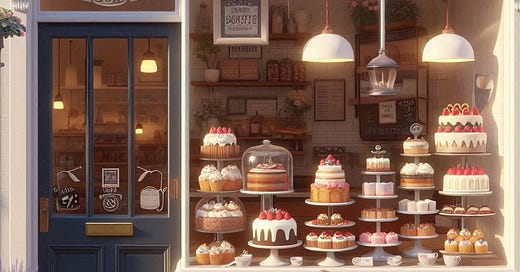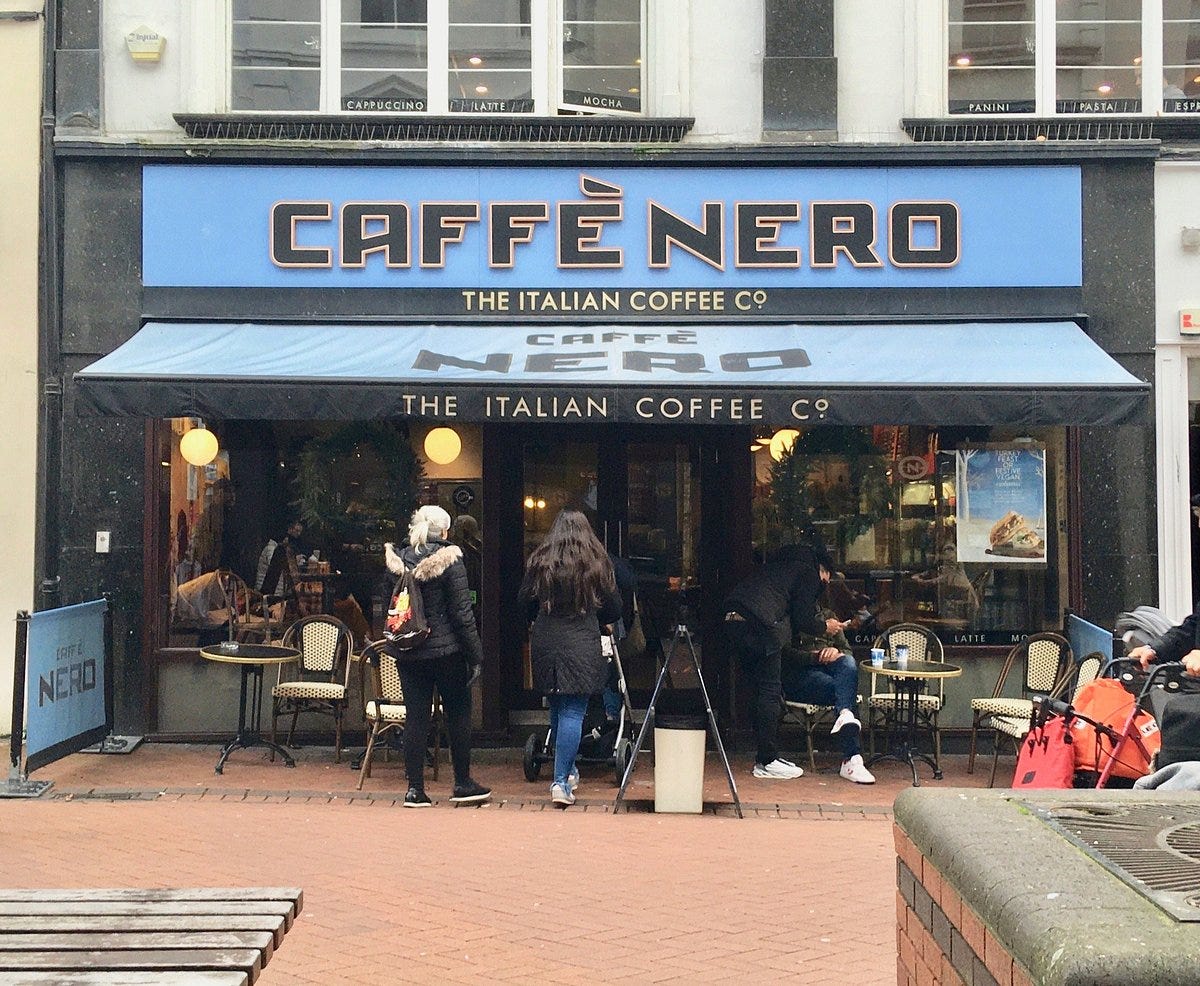He proudly serves his customers, he knows most of their names. Pleasantries abound between him and George, Carol, Lewis, and Lisa. He asks how the kids are doing at school and laughs at the tales of his patrons and their antics down the local pub where he goes on occasion. He offers congratulations following the news of a new job. Laughter and warm regard fill the air. What a scene of conviviality. The little family-run coffee shop, managed mostly by Barry, is a valued part of the community. In this piece, I will refer to it as Barry’s. His customers care about him and his shop, and it is central to many of their friendships. Barry cares about them too. People would be sad if this place disappeared. It seems to be alive and well, but things might soon change. A Cafe Nero rests nearby on this quaint Sussex high street. It is incongruous with its surroundings. I did not notice it when I last came here. An unused building advertising for business space in its front window separates it from Barry’s. The Nero has a spacious interior, providing ample seating room. I am standing in a queue that is eight deep and already out onto the pavement. Barry’s clearly cannot compete for space with Nero. I worry there is nothing to stop Nero from extending into the area directly next to it and disadvantaging further its smaller competitor. Should this happen, then Nero will have another building for the same coffee, the same sandwiches, and the same cakes behind the same frontage as it does wherever you find it. This extension would have the same colour scheme, the same or very similar seating arrangements, and the same pictures on display as in all its other branches across the country. I know that I may have to wait a bit longer at Barry's to get my drink than if I had chosen its wealthier competitor. The proprietor is working alone. Sentiments, affinities, and allegiances dictate my purchase. The frontage of Barry’s might be Victorian, and it is in keeping with the other constructions, some Georgian and some Edwardian, that make the street characteristically English.
Inside, two small tables sit under cups and saucers made in a charming English floral style. Pastoral scenes and pictures of social life decorate the walls and form a visual English continuum. A small range of treats, probably homemade, are on display in the front window. They include a Tottenham cake and a Belgian bun as parts of a colourful array. The setting is unique and at odds with its cookie-cutter counterpart. When met with a choice of fare reflecting the reality of extending globalisation and its vapid social and cultural associations, as opposed to something that counter signals this, I will always choose the latter. Waiting in line, I wonder what new endeavour the vacant building will be home to, and who might invest in it.
My mind drifts to an episode of the eponymous American sitcom Frasier (1993-2004 and 2024-present). In Dukes, We Hardly Knew Ye, psychiatrist Dr Niles Crane (David Hyde Pierce) offers his brother, the psychiatrist and radio host Dr Frasier Crane (Kelsey Grammer) the chance to invest in a property scheme. Niles eagerly tells Frasier they can make “a real killing” with Meadow Wood Properties. Frasier joins the venture and is buoyant when his energised brother explains how the pair will prosper.
After he suggests they celebrate, Frasier shows surprise when his blue-collar retired police officer father Martin Crane (John Mahoney) invites his two sons to Dukes. Dukes is the bar where Martin goes to be with his friends. In high spirits, Martin introduces his sons to the denizens of Dukes. It is evidently at the centre of a community. The visit to a working-class bar is awkward for Frasier and Niles, who have elevated tastes including opera, theatre, and fine wine.
With beer in hand, Martin proposes a toast: ‘‘I wanna make a toast. For thirty years, Duke’s has been my home away from home. I look around here tonight and I see a lot of friends, and I wanna say I’m gonna miss you. And I’m gonna miss this joint too. And may there be a special place in hell for those SOBs who are tearin’ it down to build some damn mini-mall”.
“Yeah” shouts the crowd, before Martin identifies those soon to demolish his beloved bar.
“Those snivelling, rat-face bastards from Meadow Wood Properties!”
On realising that they will in part be responsible for the destruction of Dukes, Frasier and Niles show regret when they discover that the site of the proposed development cannot be moved. Frasier momentarily consoles himself with the thought that the closure of Dukes will prevent people from drinking and endangering their health, but he knows that this is just a cope. The matter plagues his conscience, and late one night, riven with guilt, he confesses to his dad his and Nile’s investment.
Martin expresses disappointment but understands his sons do not want to obliterate Duke’s. Frasier tells Martin it meant a lot for him to be invited there and says, ‘‘it felt like we were finally getting closer. It was a momentous step”, although he accepts his dad’s point that it was a place he would ‘‘look down his nose at”. The pending demolition gives rise to a heartfelt discussion between the pair about their relationship that brings them closer together. Realising that a couple of hours remain until Duke’s will be levelled, Martin enthusiastically accepts Frasier’s suggestion that they have one last beer at Duke's.
On entering an empty Duke’s with Frasier, Martin reminds us that a place does not have to look fine for its demise to be lamented. ‘‘Sun’s up. You look around this place, in the golden early morning light…it’s still a dump. I’m gonna miss it, though.”

The episode imparts a lesson about the decisions we make with our money. Although Frasier and Niles did not set out to destroy their dad’s cherished bar, due diligence may have avoided their regrettable venture. We may not all be as affluent as the Crane brothers, but we have a say in what we fund. Even those of modest means can have an impact. Had I chosen to go into Nero rather than its less moneyed rival, a plucky business faced with a powerful corporation would have been that little bit poorer. Our purchases do not merely obtain what is at hand or wanted at the moment, we invest in the future of businesses and the place of people in a given area. I bought a coffee from Barry’s because I want Barry’s to be there the next time I come around. When we eschew the larger outlets we see everywhere nowadays, we show we want a location to retain its distinctiveness, peculiarities, and cultural character. When we choose the big company or the multinational over the independent trader, we often support the kind of capital that degrades the environment with its tiring homogeneity.

Should Barry’s serve its last latte, it would be a sad event. It is not hard to imagine friends or a couple finding a spot in its small space, strengthening their bond, and savouring their last sips at the shop while heavy with sorrow in a scene redolent to that of the last beer for the Cranes at Duke's. Barry’s serves coffee; Duke's served beer, but they are similar in the heartfelt feelings they arouse in their regulars. Both were not imposed from a distance readily standardised and replicated umpteen times elsewhere. They took shape from what was nearby. They are both one of a kind. Should your nearest Nero close for good, I cannot imagine too many tears will be shed. You may feel sad for the staff, but you will know that you can go to the next one along the high street and sit in the same surroundings. Such is the way of globalism, more places are the same and tend to mean less to us.
If you would like to support The Heritage Site with a one off donation, please press the button or scan the QR code below.
References
KACL 780.net, Duke's, We Hardly Knew Ye, https://www.kacl780.net/frasier/transcripts/season_2/episode_5/dukes_we_hardly_knew_ye.html , accessed: 6/8/24






